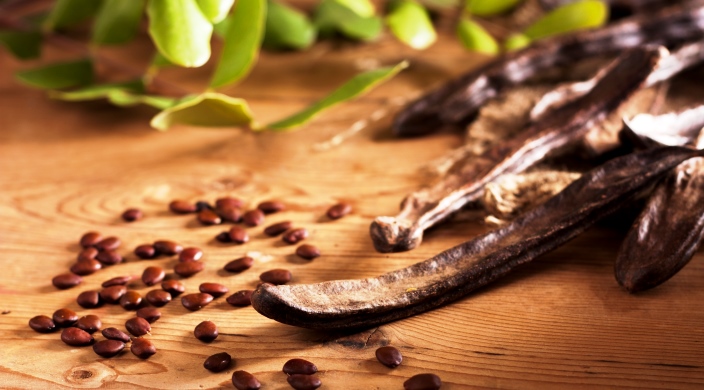
Years ago, on a cold and sparkly winter afternoon, I sat with my younger sister in the living room, both of us savoring the long, dark pods of chewy bokser we had saved from our Tu BiShvat celebration at Religious School. For us, the smell and taste of this exotic food had become synonymous with our yearly celebration of Tu BiShvat, along with the personalized certificates for the trees we’d planted in Israel.
Recently, I wondered if I could find that familiar Tu BiShvat treat. Not sure if “bokser” was just my parent’s pronunciation or that I was even remembering its name correctly, I went online. My search for alternate spellings, such as “bukser,” “buxer,” and “bockser,” lead me to an article in The Forward, which explains that bokser is the Yiddish word for the pods of the carob tree, called “St. John’s bread” in English and haruv in Hebrew.
I live in New York, where Tu BiShvat arrives in the middle of winter. Without seeing birds nesting in leafy branches or anyone seeking shade, I used to wonder how to celebrate Tu BiShvat as an adult, beyond planting trees in Israel and eating bokser.
Luckily, my answer came from Rabbi Stephen Wise Goodman of the Garden City Jewish Center, who spoke to the congregation about how we, as individuals, can take concrete steps to help protect the environment. He talked about the importance of using CFL or LED light bulbs and the value of bringing reusable bags to the supermarket. Both of these suggestions sounded easy to implement, so my family switched out our incandescent bulbs, and the trunk of my car is now filled with a huge assortment of reusable shopping bags that I can easily grab on my way into a store.
Today, I try to observe Tu BiShvat by continuing on my own path to adopting more and more green habits. Here are some simple suggestions that I continue to strive toward, while hoping to add more each year. Of course I’ll be on the lookout for my old-time favorite, bokser, while I renew my determination to celebrate the trees by doing my part to protect our environment.
Here’s my list: 11 simple ways to go green(er) and shrink your carbon footprint. What would you add to the list?
- Switch to reusable grocery bags or reuse plastic ones. Keep bags in within easy reach, like in your car trunk, near the front door, or in your backpack. Learn more from the Religious Action Center.
- Compost. Set aside a container for fruit and vegetable scraps, non-greasy food scraps (rice, pasta, bread, cereal), coffee grounds and filters, teabags, egg and nut shells, pits, cut or dried flowers, houseplants, and potting soil. Some local farmers markets, like the Greenmarket in New York City, will take your compost. If you have a yard, you can use your compost as fertilizer.
- Stock your desk at work. Bring washable mugs, reusable water bottles, plates, and bowls. I know someone who even brings utensils and cloth napkins!
- Eat local, in-season, organic foods that grow in the earth. Try to cut back or eliminate meat from your diet. The Cornell Cooperative Extension explains the benefits of pesticide-free lawns and gardens. Learn more by reading Michael Pollen’s, The Omnivore’s Dilemma, Rabbi Mary Zamore’s The Sacred Table, and Kristina Turner’s The Self Healing Cookbook: A Macrobiotic Primer for Healing Body, Mind and Moods With Whole, Natural Foods.
- Switch to natural cleaning products. Remember vinegar, baking soda, lemons, and olive oil? Martha Stewart does.
- Switch out old light bulbs for LED or CFL options. Replace your five most frequently used light fixtures or the lightbulbs in them with ENERGY STAR® qualified products and you will help the environment while saving money on energy bills. Learn more from the Religious Action Center.
- Recycle, recycle, recycle! This includes paper, newspaper, plastic, cardboard, batteries, and electronics.
- Use a drying rack or hang clothes outside – reminiscent of my childhood, when our bed sheets, towels, and clothes dried outside in the fresh air.
- Conserve water. Switch from long baths to short showers. Turn off the faucet while brushing teeth or shaving. Wait until your dishwasher is full and run fewer loads.
- Unplug “phantom loads.” This phrase refers to electronics, such as cell phone chargers or computers, that draw energy even when they are turned off. Wasted energy can be reduced by turning the power strip off at night or when the items are not being used.
- Tell the president to protect sacred spaces and our public lands. Sign a letter to the president explaining that Interior Secretary Ryan Zinke's recommendations to shrink protected national monument areas, as well as allowing industrial activities such as commmercial fishing, logging, or mining within their boundaries are inconsistent with our stewardship values.
Check out additional links and ideas from the Environmental Protection Agency on going green at home and at work, and visit the Religious Action Center of Reform Judaism’s environment page for more about the Jewish imperative to protect our earth.
Related Posts

Harnessing the Power of our Mothers Around the Seder Table

Melding Tradition and Innovation: Our Interfaith Toddler Naming Ceremony


